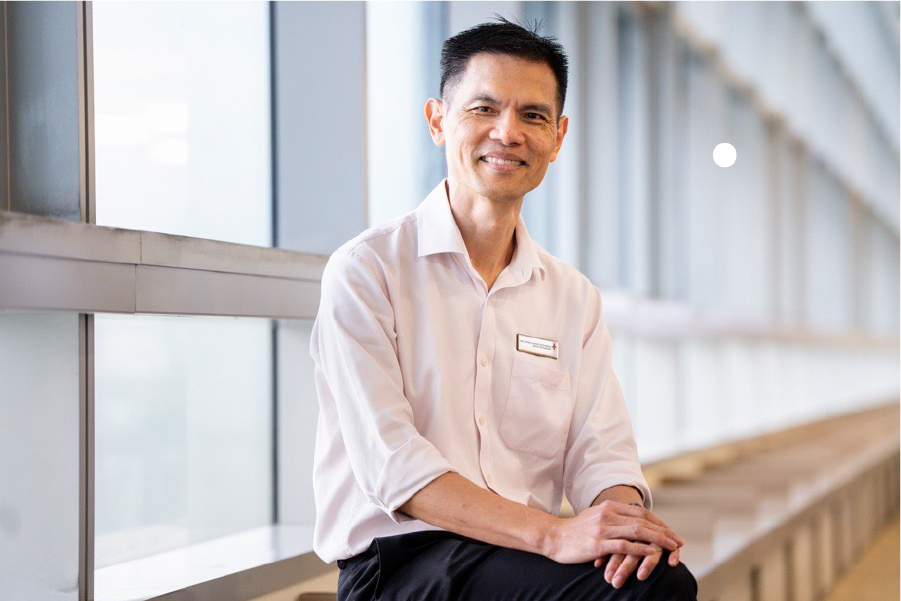Lifestyle changes, personalised monitoring and informed choices
can help prevent, manage or even reverse diabetes mellitus.
Issue 8 | March 2025

 Subscribe and ensure you don't miss the next issue!
Subscribe and ensure you don't miss the next issue!
Diabetes is a silent epidemic that claims an estimated 6.7 million lives globally each year. One in 10 adults is affected, making it a leading cause of death worldwide. In Singapore, the prevalence of diabetes has steadily risen over the years. According to the latest National Population Health Survey, one in 14 residents aged 18 to 74 years self-reported having diabetes. However, the actual prevalence, particularly of undiagnosed diabetes is in reality much higher.
“In any population, about 30 per cent of people are unaware that they have diabetes, often discovering it only after complications surface, says Adjunct Associate Professor Khoo Chin Meng, Head & Senior Consultant, Division of Endocrinology, Department of Medicine, National University Hospital (NUH). “About 15 per cent of our population are at very high risk of developing the condition. If nothing is done, 30 to 50 per cent of them will progress to diabetes within eight years.”
Moreover, diabetes is increasingly affecting younger individuals. Rising obesity levels, sedentary lifestyles and poor dietary habits are driving an increase in cases among those under 40, including teenagers. Gestational diabetes is also on the rise among women, sometimes persisting after pregnancy and increasing long-term health risks for both mother and child.
Despite these sobering trends, diabetes is not inevitable. “A combination of the right mindset and tools can help tackle this health crisis,” says Adj A/Prof Khoo. “Prevention and timely management require not just medical interventions but a fundamental shift in how individuals take charge of their health.”
The right mindset and the right tools
Diabetes is a chronic disease that, if left unchecked, can lead to severe long-term consequences. The condition occurs when the body is unable to regulate blood sugar levels effectively, resulting in high sugar levels (hyperglycaemia) which can damage small blood vessels and tissues in the body. This can cause complications including kidney failure, blindness, stroke and heart attack, as well as lower limb amputation.
There are two primary forms of the condition: Type 1 diabetes, an autoimmune condition in which the body produces little to no insulin; and Type 2 diabetes, where the body either does not produce enough insulin or is unable to use it effectively. While Type 1 is less common, Type 2 accounts for more than 90 per cent of all diabetes cases and is closely linked to lifestyle factors such as diet, obesity and physical inactivity.
This connection between lifestyle and disease progression highlights an important point: diabetes is not an unavoidable fate but a condition that can be managed — and in some cases, reversed — with the right approach. Doctors at NUH are shifting away from the traditional model of prescribing treatments. Instead, they adopt a more patient-centred approach, empowering individuals to take an active role in their health management.
“If you have diabetes at the age of 45 but manage to reverse it, you are far less likely to develop complications by the time you reach retirement age,” adds Adj A/Prof Khoo. “That shift in mindset — reversing diabetes and taking control of your health before serious complications set in — can make all the difference.”
A major hurdle, however, is diet. It remains one of the most challenging aspects of diabetes management. Food has always been deeply embedded in Singapore’s culture and heritage — dietary changes may be challenging for many patients. While doctors and dietitians can offer general guidance, responses to different types of food vary from person to person. For instance, individuals can have differing glycaemic responses to the same carbohydrate — bee hoon, pasta or bread — due to factors like insulin secretion function, insulin sensitivity, gut microbiome composition and overall dietary patterns. What triggers a sharp spike in blood sugar in one, may have a milder effect on another.
This is where wearable continuous glucose monitoring (CGM) devices are proving to be a valuable tool in diabetes management. Unlike traditional finger-prick tests, CGMs provide real-time feedback on how different foods affect blood sugar levels throughout the day. Worn on the belly or arm, these discreet wearables provide personalised feedback that helps individuals make more informed choices about their diet and lifestyle, and can help nudge them to maintain healthier blood sugar levels.
Beyond lifestyle changes, newer medications are also helping patients manage diabetes. Sodium-glucose co-transporter 2 (SGLT-2) inhibitors help lower blood sugar levels while also reducing the risk of complications such as kidney and heart disease. Another class of drugs, glucagon-like peptide-1 (GLP-1) agonists, not only regulates blood sugar but also aids in weight loss — an important factor in managing Type 2 diabetes.
A people’s movement
Over the years, Singapore has made significant progress in raising awareness and providing resources to combat diabetes. Government-led initiatives have encouraged healthier lifestyles. For instance, Nutri-Grade labels on beverages indicate their sugar and saturated fat levels, helping consumers make more informed choices. The Healthier Choice Symbol on food packaging guides consumers towards better dietary decisions. Eateries have included healthier options in their menus, while government subsidies have made diabetes screening more accessible and affordable. These efforts have laid a strong foundation for prevention and early intervention.
“If you put it all together, a lot has happened over the years. But ultimately, the fight cannot be a movement coming from the health ministry or doctors. It has to stem from an individual’s desire and the community. In that regard, we are doing our part to get more patients activated, helping them navigate and offering the best treatments available,” adds Adj A/Prof Khoo.
Like this article? Simply subscribe to make sure you don't miss the next issue of EnvisioningHealth!




















